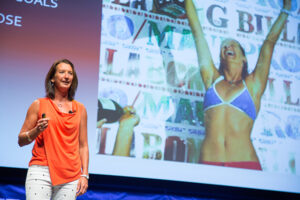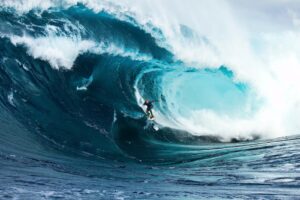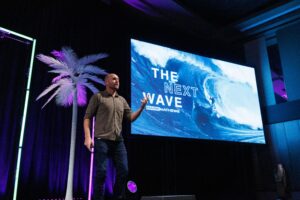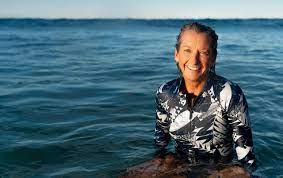
LAYNE BEACHLEY, MARK MATHEWS AND COOPER CHAPMAN SHARE THEIR NEW LIFE PURPOSE, FROM SEA TO STAGE
A new wave of wisdom ripples from the lineup, sidling up to the Eckhart Tolles and Brené Browns to form their own sub-genre. A platform, a message and jaw-dropping anecdotes to captivate an audience. Professional surfers, it seems, make excellent self-development facilitators.
Most of us have invested money, time or both into learning or becoming better at something. Surfing? Guitar? Maths? Salsa? But have we put those resources into improving our mindset?
MINDFULNESS & MENTAL HEALTH
A focus on self certainly isn’t anything new. Eastern culture has practised having a healthy mind for thousands of years, but mindfulness has only catapulted into mainstream this century. Perhaps, thanks to millennials who thirst to talk openly about mental health.
The Nielsen Book Trend Report found that, in 2020, Australian consumers purchased over 79,000 wellness titles, totalling 5.4 million copies. And the Australian Bureau of Statistics’ 2020-21 National Study of Mental Health and Wellbeing research found that 3.4 million Australians aged 16-85 years saw a health professional for their mental health, 13% saw a GP for their mental health, 8% saw a psychologist, and 612,000 Australians accessed other services for their mental health via phone and digi platforms.
Much of the mindset messaging is similar, even for fundamentally unrelated themes, such as tapping into courage, living your best life, or cultivating happiness. Words such as empathy, kindness, gratitude, purpose, mindfulness and meditation are commonly used and for good reason. Mark Matthews, Layne Beachley and Cooper Chapman are a few Aussie surf athletes who have progressed from cutbacks to keynotes. The unique personalities, delivery of the facilitators, the stories and perspectives they share, draw us in and connect with us as individuals for differing reasons.
“this feeling of fear, whether surfing mountains or public speaking, is the same”
MARK MATHEWS

Mark Mathews is terrified. It’s not because he’s about to be whipped into mutated Shipsterns. Nor because he’s paddling out for his first surf at Waimea since a severe injury, as vividly shown in his Other Side of Fear documentary. No, Mark is about to present his first keynote. This humble surfer from Maroubra in Sydney’s east will walk on stage to face an audience who probably doesn’t know who he is and possibly don’t surf themselves. All are eager to learn something of value in return for the time spent in their chairs. And to say he’s nervous is an understatement. But as Mark explains, this feeling of fear, whether surfing mountains or public speaking, is the same.
“It’s the same anxious nerves, especially in the lead-up,” Mark says. “The most fear I feel with big-wave surfing is the week before I surf. That’s the hardest time because you’ve got ample [opportunity] for your brain to come up with the different ways you might die.” Obviously, dying during a presentation is much less likely, and Mark explains that while the danger’s not there, the brain doesn’t process socialised fear rationally, so the triggers parallel. “For speaking, especially when I first started, it would be a month of constantly catching myself thinking about doing this keynote, imagining the audience and all the different ways I’m going to stuff up, and how they’re not going to like it and [that I’ll] get ‘booed’ off stage.”
“Do you want it more than you fear it?”
Given Mark’s keynote is titled “Life Beyond Fear”, he’s perfectly equipped to share how he pushes through those barriers. “The only way through fear is experience. You’ve just got to do something over and over and over again to get the skillset and the knowledge that you can then use to step into whatever environment makes you nervous or anxious,” he says.
He’s not saying it’s easy, but it’s doable. Mark says there’s first just one key thing you must ask yourself: “Do you want it more than you fear it?” Mark posed the same question when he was asked to present his first keynote. It was in Hawai’i, possibly the most fitting location to talk about fear, being the breeding ground of his big-wave endeavours and without the advantage of recognition and adoration from a hometown crowd. He wasn’t a public speaker. He wasn’t a media personality. Heck, even “extrovert” isn’t a word you’d use to describe Mark. But he wanted it more than he feared it.

Mark shares that notion with his audiences. “You have to want what’s on the other side of the process more than being afraid of what it takes to get there.” At first, you might wonder how Mary-Lou from Midwest America or Scotty from marketing could relate to Mark’s anecdotes of professional surfing, chasing big waves and critical sporting injuries. But Mark expresses that the fundamentals and tools are the same. He’s lucky also to have captivating content to help deliver the message.
“I like to offer entertainment,” he says. “And just a dash of inspiration.” His talks start with a clear call to action: “You’ve first got to take time to figure out for yourself where you’re at in life and where you want to go,” Mark says. “What do you want from life before you die? Careers and finances, passions and hobbies, personal life and relationships, health goals … What are the things you want to achieve in the next year, five years, ten years?” But facing our fears, means getting comfortable with another “f” word. “There’s no two ways about it. You’ll fail along the way,” Mark says, before encouraging us not to be disheartened by this. “Good performance coaches and psychologists say that the best learning ratio is 30% failure, 70% skill development,” he adds. “I’ve found that really hard in recent times, and I wish I knew this when I was younger, to shift perspective and to feel lucky to be able to go through this failure.”
Given medical professionals repeatedly told Mark he might never fully recover from injury to surf again. Then he did and still is; he knows failure and facing fear all too well.
LAYNE BEACHLEY

For Layne Beachley, winning seven world surfing titles, six of those consecutively, is enough in itself to make for an inspiring motivational educator. Throw on top of that dealing with the knowledge she was adopted, tragically losing loved ones and being struck with chronic fatigue during the pinnacle of her professional career and you’ve got enough PowerPoint material to serve a lifetime of Ted Talks. But Layne reveals that her start in this post-surfing speaking spotlight was a little rocky.
“The first keynote I ever did was after I’d won my sixth world title was absolutely appalling. I got a written complaint,” Layne laughs. “I was poorly prepared. I swore. I remember getting into the hire car [post-event] feeling really deflated that I let them, and myself, down.” Long-time friend Guy Leech reminded Layne that, much like reaching the GOAT surfing status, she’d need to train, prepare and surround herself with coaches and mentors to get good at this new gig.
“having the courage to look back on aspects of myself that I’m not proud of”
Several years on, Layne is a keynote queen and founder of the Awake Academy, which she sums up as, “A platform for self-empowerment, focusing on cultivating connection, growth and happiness in humanity. To help people build awareness of who they want to be at their fundamental core and awaken their spirit to live a life they truly love.”
Layne has sifted through her most valuable life lessons, both in and out of the water, and crafted them into compelling and often life-changing, self-paced online courses, using everything from neuroscience and psychology to NLP breath work. But let’s be clear, Layne couldn’t be doing any of this without first doing the work herself. “What’s been the biggest transformation for me personally has been having the courage to look back on aspects of myself that I’m really not very proud of,” Layne says. “I can’t go back and fix it, but I can certainly learn from it and prevent it from happening again.”
Layne reflects on her time on the surfing Tour as often being a “devaluing and unhealthy environment for female surfers”, which was also documented in Girls Can’t Surf and regrets allowing that setting to harden her nature. “It was an environment where it was very difficult [for the women on Tour] to see opportunity. All we ever saw was [a] threat in each other,” Layne says. “I wish I had been more respectful of people around me and shown myself more compassion. I didn’t learn that until later on, and by then, I had destroyed relationships.”
“Getting liposuction in her 20s due to body image insecurities is something Layne deeply regrets”
To evolve and “live your truth”, Layne describes one self-sabotaging habit that needs to be kicked quick-smart: Comparison. During the ’90s, Layne constantly sized herself up against her main rival, four-time world champion Lisa Andersen, the then golden girl of women’s surfing. “I was suffocated by comparison,” Layne reveals. “I was constantly comparing myself to Lisa and never felt enough. She was beautiful. She was an incredible surfer. She was deeply respected. And I looked at her and thought, Well, I’m nothing like that.”
This negative mindset made Layne’s rise to world champion a lot harder emotionally than it needed to be, had she just focused solely on her journey. Getting liposuction in her 20s due to body image insecurities is something Layne deeply regrets. “What the heck was I thinking?” she bellows. “Now, I realise comparison leads to a sense of inadequacy. And it doesn’t help you be the best version of yourself.”
Layne believes the many road bumps she’s bounced over throughout life help her audience and course participants shortcut the struggle.
COOPER CHAPMAN
For Cooper Chapman, someone else’s struggle was the catalyst for his pivot from a professional surfing career into a completely unexpected direction. After learning that two of his sister’s young friends had taken their lives, Cooper decided to turn his feeling of hopelessness into founding The Good Human Factory.
“I realised the education I had around mental health was so different to what I discovered post-school,” Cooper says. “It started with running workshops at schools, educating on things such as kindness, empathy, gratitude, mindfulness and all the simple skills and tools we can implement into our lives.” Cooper recognises that some amazing mental health resources are on offer, particularly in Australia. Still, from his perspective, they mainly target the “one in five Australians” who have poor mental health. “[My aim is to] educate and inspire the four who don’t and grow that number.”
Cooper acknowledges that he’s not a medical professional and is quick to point people in the right direction if it’s evident that’s something they might need. But his approach is to make fostering good mental health cool, fun, and engaging. “I give people touchpoints or a small skill they can involve in their everyday life and encourage them to dedicate one per cent of their day to improving their mental health.”
“his approach is to make fostering good mental health cool, fun and engaging”
Ocean-inspired analogies help Cooper communicate his messages. Such as trying to remove fins from a surfboard that won’t budge without one simple tool—a fin key. “I explain that today I’m going to give you simple tools that can help your mental health.”
Cooper uses a brimming bucket of water to depict life’s struggles. Cup-by-cup he empties it, each time he makes a touchpoint that contributes to good mental health. The session finishes with an empty bucket, which represents a good state of wellbeing. “I encourage [that], every time you brush your teeth, reflect on what went well today. And I do an exercise where everyone fills out a gratitude card. I do some storytelling on empathy and mindfulness exercises where the audience looks around at what they can see, the shapes, the colours and connecting to their senses. We do simple breathwork exercises, and then I end on the importance and impact of kindness.”
Even before establishing The Good Human Factory, Cooper identified the appetite for self-care tools after helping run surf camps for Manly Surf School owner and high-performance surf trainer Matt Grainger. “We did surfing, skating, gym sessions and a whole bunch of activities,” Cooper says. “But it was the visualisation and meditation sessions that the kids couldn’t stop talking about.”
While Cooper notes that this journey has taken a lot of hard work and has been a long time in the making, on top of his workshops, his booming business now includes the podcast, merchandise and collaborations—all under The Good Human Factory umbrella.
WHY ARE SURFERS SUCH GOOD FACILITATORS?
So, what is it about professional surfers that make for such successful self-help facilitators? Perhaps it’s succumbing to the ocean’s unpredictability, a desire to live life to its fullest, going out into the unknown and, of course, drive and commitment. We asked our three mentors for their insights.
“I’ve got lots of spectacular photos and video footage that audiences love no matter whether they surf or not; it’s entertaining,” says Mark, noting it all helps him communicate resilience and courage.
“We learn how to read shadows,” says Layne. “You drift over the crest of the wave, looking onto the horizon with anticipation and optimism that there’ll be another wave. We surrender to a force more powerful than us,” she adds.
“Being a young surfer, travelling and training my whole life has required discipline,” says Cooper, noticing the benefit of storytelling and connection borne from travelling the world and experiencing different cultures, which helps him captivate an audience.
What about the lineup? Can their philosophies lead to a better space for us all to benefit from?
Mark believes that if people are living to their core values, that usually makes them happier. “Eighty per cent of your brain’s ability to create positive emotion comes from progression towards something you believe is valuable,” he says. “If people did nothing else but took a month to figure out what they want to achieve in life and that enhances their brain’s ability to witness that progression, then you’re going to have happier people, which might lead to a better lineup,” he says.
Layne believes a lineup could be a more pleasant place if we look both inwards and outwards. “If we can create concentric circles of empathy and compassion around us, for others and ourselves, then it would have a ripple effect, because I really feel that this world is suffering from a massive empathy deficit,” she says.
Cooper finds power in the science behind kindness and encourages us not to get riled up about drop-ins or frustrated by beginner surfers. “Kind people are happier people. And just have that mindset of being grateful. You get to be out in the ocean and surf,” he says.
“If you’re striving to be perfect, then you’re constantly pushing uphill”
Mark remembers a moment when gratitude hit him hard. He was in hospital and in a dark headspace, struggling to accept the outcome of his serious surfing injury. A bedside visit from a young fan who’d had a snowboarding accident instantly shifted Mark’s perspective.
“He was a quadriplegic. I had no idea. I was like, Crap, I’m the luckiest person alive. I could’ve hit that reef a million different ways. Gratitude and feeling lucky is a very energising emotional state. It shifts you from [the] sympathetic to [the] parasympathetic nervous system, where your body function is better. Write three things down you’re grateful for. It’s a top-down hack to have more energy and be more motivated.”
Layne’s encourages us to give ourselves a break: “Let go of perfectionism. It’s a myth. If you’re striving to be perfect, then you’re constantly pushing uphill. That’s unattainable. And forgive yourself for the mistakes you’ve made. Life’s too short for guilt,” she says.
Cooper suggests going for what you want rather than waiting to be ready. “The act of confidence comes before the feeling of confidence. Don’t wait for the feeling of confidence before acting on something. Instead, start doing it, and the feeling will follow.”
What do Mark, Layne, and Cooper have in common, regarding surfing and adversities? They’ve discovered a deep sense of purpose and are paving a new path for surfers (and non-surfers) to take their mental and emotional health to a new strength in an uncertain world.
As this article ends, we imagine Cooper scooping out the last cup of water from his bucket, like he would in his workshop. “I wake up every day inspired to make change and help other people live a better life,” he says. “I feel the path I’m on now is far more fulfilling than being an athlete.”
Much like improving our surfing, the wellness journey is ours to map and forever our endeavour, whether you’re a beginner in the breakers or dominating the peak. The best bit? Our commitment to self-betterment creates an impact far beyond our bubble.
